Documented Practices and Resources for Productive, Respectful Relationships Between Researchers and Community Members
Scientific research in the Arctic necessitates good communication and cooperation with northern communities. The following list is a compilation of resources, recommendations, and "best practices" from a variety of organizations. This webpage is intended to be a living resource and will be updated as new information becomes available. Each community has a unique set of requests for researcher conduct and level of desired inclusivity. As such, direct communication and relationships with community leaders should be the highest priority.
Please contact Lisa Sheffield Guy (lisa [at] arcus.org) or Helen Wiggins (helen [at] arcus.org) with:
- Comments or additional resources for this page;
- Suggestions for tools or activities that would foster collaboration between researchers and Arctic community members;
- Ideas to advance inclusion of Indigenous communities in research; or
- Help finding contacts and representatives in northern communities.
We are grateful to the following people for providing feedback and additional resources: Carolina Behe (Inuit Circumpolar Council - Alaska), Vera Metcalf and Julie Raymond-Yakoubian (Kawerak, Inc.), Karen Pletnikoff (Aleutian Pribilof Islands Association, Inc.), and Kaare Erickson (Ikaaġun Engagement).
This webpage is supported by the National Science Foundation - Arctic Sciences Section through Cooperative Agreement PLR-1928794.
Documented Practices and Resources: Across Northern Communities
Equitable Arctic Research: A Guide for Innovation

Cana Uluak Itchuaqiyaq, PhD
Citation: Itchuaqiyaq, Cana Uluak. 2023. Equitable Arctic Research: A Guide for Innovation.
Web: https://cana-uluak-itchuaqiyaq.ck.page/9e2904236d
- This guide to equitable research in the Arctic includes information, suggested actions, workbook style writing/reflection prompts, and ongoing support via email. Learn more at www.itchuaqiyaq.com.
Indigenous Resources Webpage
Heather Sauyaq Jean Gordon
Web: https://sites.google.com/view/sauyaq/home/resources?authuser=0
- This website shares a variety of resources, including ethical guidelines, scholarship opportunities, Indigenous books/articles, Indigenous colleges and university programs, social media, and more.
Connecting Arctic Priorities (CAP) Portal
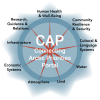
Navigating the New Arctic
Web: https://www.nna-co.org/cap-portal
- The CAP Portal is a searchable collection of reports and documents written by Tribes, Arctic communities, and Indigenous organizations.
Circumpolar Inuit Protocols for Ethical and Equitable Engagement

Inuit Circumpolar Council
Citation: Inuit Circumpolar Council. 2022. Circumpolar Inuit Protocols for Ethical and Equitable Engagement.
Web: https://iccalaska.org/wp-icc/wp-content/uploads/2022/06/EEE-Protocols-L…
- These eight protocols provide a pathway for success for researchers, decision-makers, and others working in the Arctic through equitable and ethical engagement and partnerships.
A Framework for Co-production of Knowledge in the Context of Arctic Research / Negeqlikacaarni Kangingnaulriani Ayuqenrilnguut Piyaraitgun Kangingnauryararkat

Ecology and Society
Citation: Ellam Yua, J. Raymond-Yakoubian, R. A. Daniel, and C. Behe. 2022. A Framework for Co-production of Knowledge in the Context of Arctic Research. Negeqlikacaarni Kangingnaulriani Ayuqenrilnguut Piyaraitgun Kangingnauryararkat. Ecology and Society 27(1): 34.
Web: https://www.ecologyandsociety.org/vol27/iss1/art34/
Download PDF: https://www.ecologyandsociety.org/vol27/iss1/art34/ES-2021-12960.pdf
- This paper calls for systematic change in the conduct of research in the Arctic and provides a framework for co-production of knowledge.
Circumpolar Inuit Protocols for the Ethical and Equitable Engagement of Inuit Communities and Indigenous Knowledge

Inuit Circumpolar Council
Citation: Inuit Circumpolar Council. 2021. Ethical and Equitable Engagement Workshop Series Summary Report. International.
Web: https://iccalaska.org/wp-icc/wp-content/uploads/2022/02/Inuit-Circumpol…
- This report from a series of workshops informs the development of the forthcoming Inuit circumpolar protocols on the ethical and equitable engagement of Inuit communities and Indigenous Knowledge as a crucial tool in advancing Inuit sovereignty, directions, and priorities within institutions and international
fora.
Ethical and Equitable Engagement Synthesis Report
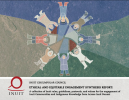
Inuit Circumpolar Council
Citation: Ethical and Equitable Engagement Synthesis Report: A Collection of Inuit Rules, Guidelines, Protocols, and Values for the Engagement of Inuit Communities and Indigenous Knowledge from Across Inuit Nunaat. Inuit Circumpolar Council. September 2021. 39 pp.
Web: https://iccalaska.org/wp-icc/wp-content/uploads/2021/09/ICC-EEE-Synthes…
- This report provides a synthesis of 85 previously developed documents from across Inuit Nunaat, including Alaska, Canada, Greenland, and Chukotka.
Local and Indigenous Community Engagement and the Co-Production of Knowledge in NSF-Funded Arctic Science and Research
The National Science Foundation – Office of Polar Programs
Web: https://www.nsf.gov/geo/opp/arctic/ace/
- This web resource for Arctic Community Engagement (ACE) provides a starting place for NSF-funded researchers, Arctic residents, Indigenous communities, and collaborators to better understand how the Foundation is supporting work and expanding collaborations.
Co-creating Research Projects - Some Personal Experiences from Saami Council and Arctic Researchers

The Saami Council
Web: https://www.saamicouncil.net/news-archive/co-creating-research-projects…
- This web-based public report shares successful approaches the Saami Council has used for co-creating and co-designing research products.
TEK Talks
University of Alaska Fairbanks, Geophysical Institute Graduate Student Association
Web: https://sites.google.com/view/tektalks/home
- Traditional Ecological Knowledge Talks is a lecture series with focus on understanding of Indigenous peoples & cultures, clarifying terminology, and sharing resources. A link to the first talk in the series is shared below.
TEK Talk 1 - Cross-Cultural Miscommunication
Margaret Rudolf
Recorded Talk:
Northern Communities Strategic Document Synthesis Narrative
Interagency Arctic Research Policy Committee
Citation: Northern Communities Strategic Document Synthesis Narrative. 2020. IARPC Collaborations. 16 August 2020. 21 pp.
Web: https://www.iarpccollaborations.org/uploads/cms/documents/northern_comm…
- This document provides a synthesis of Arctic research priorities and needs identified in public facing, community generated strategic documents.
Achieving Equity and Representation for Indigenous Peoples in Arctic Research

University of Alaska Fairbanks - Center for Arctic Policy Studies
Citation: Carlo, Nikoosh. 2020. Achieving Equity and Representation for Indigenous Peoples in Arctic Research. Policy Call. University of Alaska Fairbanks, Center for Arctic Policy Studies. 2 pp.
Web: https://www.uaf.edu/caps/our-work/policy-perspectives-files/PC-CAPS-Ind…
- This policy call outlines ways for researchers and institutions to address inequity and improve representation of Indigenous Peoples in Arctic research.
Developing Best Practices for Working in Arctic Communities
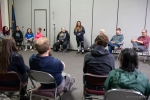
Woodwell Climate Research Center
Web Resource: https://www.woodwellclimate.org/developing-best-practices-for-working-i…
- This web resource provides twelve principles for working with northern communities and additional resources.
Report of the Working Group on Culturally Responsive Science Outreach and Engagement

Citation: Report of the Working Group on Culturally Responsive Science Outreach and Engagement: A report to the North Pacific Research Board, Alaska Sea Grant, and ARCUS. May 2019. Anchorage, Alaska.
Web: Download Full Report (PDF - 537 KB)
Improving Dialogue Among Researchers, Local and Indigenous Peoples and Decision-makers to Address Issues of Climate Change in the North

Web: https://link.springer.com/article/10.1007/s13280-019-01277-9
Citation: Callaghan, T.V., Kulikova, O., Rakhmanova, L. et al. 2019. Improving Dialogue Among Researchers, Local and Indigenous Peoples and Decision-makers to Address Issues of Climate Change in the North. Ambio. https://doi.org/10.1007/s13280-019-01277-9.
- Challenges and recommendations for working together from local and Indigenous peoples and researchers in Siberia.
Different Ways of Knowing: Successful Examples of Knowledge Co-production in Arctic Research
IARPC Collaborations Webinar - 16 February 2018
Web: https://www.iarpccollaborations.org/events/10781
Working with Northern Communities to Build Collaborative Research Partnerships

Arctic Institute of North America
Web: http://pubs.aina.ucalgary.ca/arctic/Arctic67-3-419.pdf
Citation: J.M.E Tondu, A.M. Balasubramaniam, L. Chavarie, N. Gantner, J.A. Knopp, J.F. Provencher, P.B.Y. Wong and D. Simmons, Working with Northern Communities to Build Collaborative Research Partnerships: Perspectives from Early Career Researchers. Arctic Institute of North America, Calgary, Alberta, Canada. 2014. 11 pp.
- Recommendations for actions to facilitate collaborative research partnerships
Related webinar: Working with Northern Communities to Build Collaborative Research Partnerships: Perspectives from an Early Career Researcher
Association of Polar Early Career Scientists
Web: https://vimeo.com/258812715
APECS Canada webinar: Working with Northern communities to build collaborative research partnerships from APECS Webinars on Vimeo.
The Power of Multiple Perspectives: Behind the Scenes of the Siku-Inuit-Hila Project
Web: https://link.springer.com/chapter/10.1007%2F978-90-481-8587-0_11
Citation: Huntington, H.P., Gearheard, S., and Kielson Holm, L. 2010. The power of multiple perspectives: Behind the scenes of the Siku-Inuit-Hila Project. in SIKU: Knowing Our Ice. pp. 257-274.
- A new approach for collaborative research with Inuit and scientific knowledge.
Draft Guidelines for Improved Cooperation Between Arctic Researchers and Northern Communities

National Science Foundation – Office of Polar Programs
Web: https://archive.arcus.org/guidelines/overview.html
Citation: Draft Guidelines for Improved Cooperation between Arctic Researchers and Northern Communities. National Science Foundation – Office of Polar Programs, Arlington, Virginia. 2004. 23 pp.
- Information and suggestions to improve the way researchers work with communities in the Arctic
Principles for the Conduct of Research in the Arctic

National Science Foundation – Office of Polar Programs
Web: https://www.nsf.gov/geo/opp/arctic/conduct.jsp#implementation
Citation: Principles for the Conduct of Research in the Arctic. National Science Foundation, Arlington, Virginia. 2005. 3 pp.
- Guidance on maintaining mutual respect and communication between scientists and northern residents
Ethical Principles for the Conduct of Research in the North

Association of Canadian Universities for Northern Studies
Web: https://acuns.ca/wp-content/uploads/2010/09/EthicsEnglishmarch2003.pdf
Citation: Ethical Principles for the Conduct of Research in the North. Association of Canadian Universities for Northern Studies, Ottawa, Ontario, Canada. 2003. 9 pp.
- Principles for respecting northern communities and cultures
Documented Practices and Resources: Alaskan Communities
Landscape of Tribal Communities: Context for Working in Rural Alaska

Alaska Center for Climate Assessment and Policy
Web: https://uaf-accap.org/document/landscape-of-tribal-communities-context-…
- This article will help researchers, academics, federal and state agencies — especially those doing climate work — understand complexities in villages and regions.
Kawerak-Region Tribal Research Protocols, Guidelines, Expectations, & Best Practices
Kawerak, Inc.
Web: https://kawerak.org/natural-resources/research/
Citation: Kawerak, Inc. 2024. Kawerak-Region Tribal Research Protocols, Guidelines, Expectations, and Best Practices. Nome, Alaska.
- A tribal vision for research in the Kawerak region.
Kawerak Knowledge and Research Sovereignty Workshop Report

Kawerak, Inc. and Sandhill.Culture.Craft
Web: https://kawerak.org/download/kawerak-knowledge-and-research-sovereignty…
Citation: Kawerak, Inc. 2021. Knowledge and Research Sovereignty Workshop, May 18–21, 2021 Workshop Report. Prepared by Sandhill.Culture.Craft and Kawerak Inc. Social Science Program. Nome, Alaska.
- The goal of this workshop was to build positive, meaningful, and effective relationships between Tribes and research processes. The workshop report includes outcomes, insights, and recommendations from the four-day event.
Ice Edge - The Ikaaġvik Sikukun Story
Ikaaġvik Sikukun
Web: https://www.ikaagviksikukun.org/
- This documentary about Ikaaġvik Sikukun (Ice Bridges) shares the story of a multi-year ice research project based in Kotzebue Sound, Alaska.
Navigating the New Arctic Program Comment Letter

Kawerak, Inc., Association of Village Council Presidents, Bering Sea Elders Group, and the Aleut Community of St. Paul
Web: https://kawerak.org/download/navigating-the-new-arctic-program-comment-…
- This brief letter shares collective concerns regarding the National Science Foundation's Navigating the New Arctic Program.
Qikiqtaġruŋmiut (Native Village of Kotzebue) Research Protocol & Questionnaire

Qikiqtaġruŋmiut – Native Village of Kotzebue
Web: http://www.kotzebueira.org
Download: Native Village of Kotzebue Research Protocol (PDF 127 KB)
- This document lists principles adopted by the Native Village of Kotzebue to provide guidance for researchers in any and all fields.
Understanding the Arctic Through a Co-Production of Knowledge

Inuit Circumpolar Council Alaska, Pew Charitable Trusts, and Kawerak, Inc.
Web: https://kawerak.org/co-production-of-knowledge-in-research-valuing-trad…
Citation: Behe, C., Daniel, R., Raymond-Yakoubian, J. 2020. Understanding the Arctic Through a Co-Production of Knowledge.
- A brief article, downloadable graphic, and full recorded presentation on co-production of knowledge in Arctic research share perspectives on brining together multiple knowledge systems in research.
Full video presentation:
Different Ways of Knowing: Successful Examples of Co-production of Knowledge in Arctic research
Food Sovereignty and Self Governance - Inuit Role in Managing Arctic Marine Resources

Inuit Circumpolar Council-Alaska
Web: https://iccalaska.org/media-and-reports/inuit-food-security-project/
Citation: Inuit Circumpolar Council Alaska. 2019. Food Sovereignty and Self Governance Collective Meeting: Food Sovereignty and Self Governance - Inuit Role in Managing Arctic Marine Resources. Anchorage, Alaska.
- This report provides a synthesis of frameworks for Inuit management and co-managment of marine food resources, including case-studies and food sovereignty objectives.
Sample Code of Research Ethics
Alaska Native Knowledge Network
Web: http://www.nativescience.org/communities/code.htm
- This document is a fillable template for researchers and communities to come to a clear understanding of ethics, protocols, and partner obligations
Guidelines for Respecting Cultural Knowledge

Alaska Native Knowledge Network
Web: http://www.ankn.uaf.edu/publications/knowledge.html
Citation: Guidelines for Respecting Cultural Knowledge. Alaska Native Knowledge Network, Fairbanks, Alaska. 2000. 33 pp.
- Addresses issues of concern in the documentation, representations, and utilization of Indigenous Knowledge
Research Processes and Indigenous Communities in Western Alaska: Workshop Report

Kawerak, Inc.
Web: http://www.kawerak.org/socialsci.html
Citation: Raymond-Yakoubian, B. and J. Raymond-Yakoubian. 2017. Research Processes and Indigenous Communities in Western Alaska: Workshop Report. Prepared by Sandhill Culture.Craft and Kawerak Social Science Program. Kawerak, Inc., Nome, AK. 24pp.
- Report details Indigenous community concerns with the way scientific research in Alaskan communities is typically conducted and ways forward to build stronger relationships between these groups
Indigenous Knowledge Systems/Alaska Native Ways of Knowing

Alaska Native Knowledge Network
Web: http://www.ankn.uaf.edu/curriculum/Articles/BarnhardtKawagley/Indigenou…
Citation: Barnhardt, R., & Kawagley, A. O., Indigenous Knowledge Systems and Alaska Native Ways of Knowing. Anthropology and Education Quarterly, 36(1), pp. 8-23. 2005.
- Article on Indigenous Knowledge and western science "ways of knowing"
What is Traditional Knowledge?

Alaska Native Science Commission
Web: http://www.nativescience.org/html/traditional_knowledge.html
Citation: What is Traditional Knowledge? Alaska Native Science Commission, Anchorage, Alaska. 2004.
- Includes list of issues to consider when acquiring, using, or disseminating traditional knowledge; also includes the Alaska Federation of Natives Board Policy Guidelines for Research, shared below
Improving Local Participation in Research in Northwest Alaska

University of Alaska Fairbanks and the Northwest Arctic Borough
Web: https://www.google.com/url?sa=t&rct=j&q=&esrc=s&source=web&cd=1&cad=rja…
Citation: Improving Local Participation in Research in Northwest Alaska. 2013. Final Workshop Summary and Workgroup Recommendations. 38pp.
- Report from a workshop to identify research priorities and identify best practices for involving local communities.
Alaska Federation of Natives Board Policy Guidelines for Research
- Advise those Native people who will be affected by the study of the purpose, goals and time frame of the research, the data-gathering techniques, the positive and negative implications and the impacts of the research
- Obtain informed consent of the appropriate governing body
- Fund the support of a Native research committee appointed by the local community to assess and monitor the project and ensure compliance with the expressed wishes of Native people
- Protect the sacred knowledge and cultural/intellectual property of Native people
- Hire and train Native people to assist in the study
- Use Native languages whenever English is the second language
- Include Native viewpoints in the final study
- Acknowledge the contributions of Native resource people
- Inform the Native research committee in a summary report, in non-technical language, of the major findings of the study
- Provide copies of the study to the local people
Leadership and Strength

Web: http://www.leadershipandstrength.com/wp-content/uploads/2017/06/Leaders…
Citation: Zanotti, L., Carothers, C., Apok, C., Huang, S., and Ambrozek, C. 2017. Leadership and Strength Project Report. 29 pp.
- This report includes a practices section for researchers working on the North Slope and particularly in Barrow, Alaska. A Climate of Change.
Kindea Labs
- Suggestions for researchers working in North Slope, Alaska
A Bering Strait Indigenous Framework for Resource Management: Respectful Seal and Walrus Hunting
Kawerak, Inc.
Web: https://kawerak.org/wp-content/uploads/2018/04/Respectful-hunting-artic…
Citation: Gadamus, L. and Raymond-Yakoubian, J. 2015. A Bering Strait Indigenous Framework for Resource Management: Respectful Seal and Walrus Hunting. Arctic Anthropology 52: 87-101.
- Outlines different approaches and conflicts between western resource management and local resource-use traditions
A Primer for Marine Scientists Planning Shipboard Work in Alaskan Arctic and Sub-Arctic Waters

United States Coast Guard
Web: https://www.unols.org/sites/default/files/Community%20Primer%20_%20icef…
Citation: United States Coast Guard. A Primer for Marine Scientists Planning Shipboard Work in Alaskan Arctic and Sub-Arctic Waters. A project of the Arctic Icebreaker Coordinating Committee. 2012.
- Guidelines for efficient, effective, and conflict-free interactions with Arctic communities
Cultural Awareness Training

Fairweather Science, LLC.
Web: http://fairweathersciencellc.com/cultural-sensitivity-training.html
- Cultural sensitivity training and resources for working in rural Alaska
The Ocean is Always Changing

Web: http://dx.doi.org/10.5670/oceanog.2011.78
Citation: Fienup-Riordan, A., and E. Carmack. 2011. “The ocean is always changing”: Nearshore and farshore perspectives on Arctic coastal seas. Oceanography 24(3):266–279.
- An essay outlining Yup'ik and Inuit views of the coastal environment and a strategy for integration of local observations.
Village of Wainwright - Visitor Agreement Forms
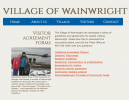
Web: http://www.villageofwainwright.org/visitor-forms.html
- The Village of Wainwright provides many useful documents for conducting research in their community, including: Research Guidelines; Researcher Memorandum of Understanding; Expectations for Visitors; Community Meeting Protocol; and more.
Documented Practices and Resources: Canadian Arctic Communities
Guidelines for Research Involving Aboriginal/Indigenous Peoples
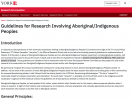
York University
Web: https://www.yorku.ca/research/guidelines-for-research-involving-aborigi…
- These research guidelines were compiled by the York University Office of Research Ethics to inform research involving the First Nations, Métis and Inuit peoples of Canada.
ScIQ: Science and Inuit Qaujimajatuqangit: Research and Meaningful Engagement of Northern Indigeous Communities, 2018.

Ikaarvik Youth ScIQ Summit
Web: https://ocean.org/wp-content/uploads/ScIq-Report-and-Recomendations-lor…
- Recommendations for meaningful engagement and effective incorporation of Indigenous Knowledge into research.
Negotiating Research Relationships with Inuit Communities: A Guide for Researchers

Inuit Knowledge Centre
Web: https://repository.oceanbestpractices.org/handle/11329/1605
Citation: Scot Nickels, Jamal Shirley, Gita Laidler (eds.), Negotiating Research Relationships with Inuit Communities: A Guide for Researchers. Inuit Tapiriit Kanatami and Nunavut Research Institute, Ottawa and Iqaluit. 2008. 38 pp.
- Practical advice to assist researchers who plan to work with Canadian Inuit communities
Coastal Monitoring Indigenous Knowledge Holders Meeting Report

Inuit Circumpolar Council
Web: https://www.arcus.org/files/publication/27519/ik_holder_workshop_report…
Citation: Coastal Monitoring Indigenous Knowledge Holders Meeting Report. 2016. Inuit Circumpolar Council and Polar Knowledge Canada, Ottawa, Canada.
- Report from a workshop including Indigenous Knowledge holders expressing the importance and practice of respect and trust when conducting research
Conduct of Traditional Knowledge Research - A Reference Guide

Wildlife Management Advisory Council North Slope
Web: http://catalog.northslope.org/catalog/entries/4802-conduct-of-tradition…
Citation: Armitage, Peter and Stephen Kilburn. 2015. Conduct of Traditional Knowledge Research - A Reference Guide. Whitehorse, YT: Wildlife Management Advisory Council (North Slope).
- Guidance and best practices that should be fully considered by anyone contemplating, undertaking, and applying traditional knowledge research
Inuvialuit Regional Corporation Guidelines for Research in the Inuvialuit Settlement Region

Inuvialuit Regional Corporation
Web: https://nwtresearch.com/sites/default/files/inuvialuit-regional-corpora…
- An introduction to the Inuvialuit Research Policy and a guide to how researchers should approach Inuvialuit communities to establish and undertake research projects
Working Together Towards Relevant Environmental Monitoring and Research in the NWT
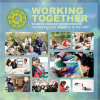
Cumulative Impact Monitoring Program (CIMP) and Aurora Research Institute (ARI)
Web: https://nwtresearch.com/sites/default/files/cimp_doc_final_low_res.pdf
- A guide to building relationships in Northwest Territory for effective and respectful research
Ottawa Traditional Knowledge Principles
The Arctic Council
Web: https://www.arcticbiodiversity.is/index.php/program/presentations2018/4…
- A working definition of Traditional Knowledge as well as principles to uphold ethical work
Sambaa K’e Dene Band Policy Regarding the Gathering, Use, and Distribution of yúndíit’õh (Traditional Knowledge)
Sambaa K’e Dene Band
Web: https://nwtresearch.com/sites/default/files/sambaa-k-e-dene-band.pdf
- Principles regarding yúndíit’õh (Traditional Knowledge), research procedures when using yúndíit’õh, and a definition outlined by the Sambaa K’e Dene Band
Conducting Traditional Knowledge Research in the Gwich'in Settlement Area - A Guide for Researchers
The Gwich’in Tribal Council
Web: https://nwtresearch.com/sites/default/files/gwich-in-social-and-cultura…
- Provides suggestions on courteous and respectful behavior when conducting research in the Gwich’in Settlement Area
Giving Traditional Ecological Knowledge its Rightful Place in Ecological Impact Assessment
Canadian Arctic Resources Committee
Web: https://iaac-aeic.gc.ca/050/documents_staticpost/cearref_3394/hearings/…
- Essay on including traditional knowledge in ecological impact assessments in Canada
Resources for Community-Based Monitoring
Community-Based Monitoring and Indigenous Knowledge in a Changing Arctic: A Review for the Sustaining Arctic Observing Networks

Sustaining Arctic Observing Networks
Web: https://iccalaska.org/wp-icc/wp-content/uploads/2016/05/Community-Based…
Citation: Noor Johnson, Carolina Behe, Finn Danielsen, Eva-Maria Krümmel, Scot Nickels, Peter L. Pulsifer, Community-Based Monitoring and Indigenous Knowledge in a Changing Arctic. Inuit Circumpolar Council, Ottawa, Ontario, Canada. 2016. 62 pp.
- This review focuses on an online atlas of community-based monitoring (CBM) projects and highlights good practices
Best Practices for Community-based Observing: A National Workshop Report

University of Idaho, Center for Resilient Communities
Web: https://www.researchgate.net/publication/305501828_Best_Practices_for_C…
Citation: Lilian Alessa, Andrew Kliskey, Peter Pulsifer, David Griffith, Paula Williams, Matthew Druckenmiller, Heidi McCann, Brit Myers, Grace Beaujean, Lisa Jackson, Best Practices for Community-based Observing: A National Workshop Report. University of Idaho, Moscow, Idaho. 2016. 30 pp.
- Provides a framework to ensure that communities, practitioners, and agencies have access to the best available science and knowledge about community based observing
Community-Based Monitoring of Alaska’s Coastal and Ocean Environment

Alaska Sea Grant
Web: https://seagrant.uaf.edu/bookstore/pubs/SG-ED-78.html
Citation: Community-Based Monitoring of Alaska’s Coastal and Ocean Environment - Best Practices for Linking Alaska Citizens with Science. 2015. Marilyn Sigman, Ed. Alaska Sea Grant. 42 pp.
- Provides guidance on establishing and managing a successful community-based monitoring project
Community Based Monitoring Handbook: Lessons from the Arctic and Beyond

Conservation of Arctic Flora and Fauna (CAFF)
Web: https://caff.is/monitoring-series/community-based-monitoring/9-communit…
Citation: Victoria Gofman, Community Based Monitoring Handbook: Lessons from the Arctic and Beyond, CAFF CBMP Report No.21. CAFF International Secretariat, Akureyri, Iceland. 2010. 52 pp. ISBN 978-9979-9778-4-1.
- Written to enhance the role of community-based observations in Arctic research projects, includes discussion of main principles of community-based monitoring activities, such as inclusiveness and respect for and recognition of knowledge-holder rights
Resources from Outside the Arctic
Reframing Funding Strategies to Build Reciprocity
Eos
Web: https://eos.org/opinions/reframing-funding-strategies-to-build-reciproc…
Citation: Tachera, D. 2021. Reframing Funding Strategies to Build Reciprocity. Eos 102.
- This article proposes changes in common funding structures as an approach to develop reciprocity and respect between western science and Indigenous communities, including greater support for activities such as relationship building.
Building Relational and Effective Partnerships with Indigenous Communities
Rising Voices Center for Indigenous & Earth Sciences, NCAR/UCAR
- This webinar recording from 20 January 2022 features James Rattling Leaf and Gwen Bridge with guidance for building partnerships beyond the Arctic.
&t=1s
Walk Softly and Listen Carefully: Building Research Relationships with Tribal Communities

The Center for Native Health Partnerships
Web: http://www.ncai.org/attachments/PolicyPaper_SpMCHTcjxRRjMEjDnPmesENPzjH…
Citation: NCAI Policy Research Center and MSU Center for Native Health Partnerships. 2012. Walk Softly and Listen Carefully: Building Research Relationships with Tribal Communities. Washington, DC, and Bozeman, MT. 35 pp.
- Guidance on the learning process needed to build trust and effective relationships with diverse Tribal nations for research partnerships
Weaving Indigenous and Sustainability Sciences to Diversify our Methods
Web: https://link.springer.com/article/10.1007/s11625-015-0349-x/fulltext.ht…
Citation: Johnson, J.T., Howitt, R., Cajete, G., Berkes, F., Pualani Louis, R., Kliskey, A. 2016. Weaving Indigenous and sustainability sciences to diversify our methods. Sustainability Science 11: 1-11.
- A special edition of papers focusing on the importance of Indigenous observations and perspectives in collaborations with sustainability scientists.
San Code of Research Ethics
South African San Institute
Web: http://trust-project.eu/wp-content/uploads/2017/03/San-Code-of-RESEARCH…
- Brief code of ethics for researchers working with the San community in South Africa
The Handbook of Ethical Research with Ethnocultural Populations and Communities

Web: https://books.google.com/books?id=_lDu8IbqbRkC
Citation: The Handbook of Ethical Research with Ethnocultural Populations and Communities. 2006. Trimble, J.E. and Fisher, C.B., (eds.), Sage Publications, Inc. 357 pp.
- Provides guidance to researchers on responsible, ethical conduct of research and culturally sensitive decision-making strategies
Supporting Local and Traditional Knowledge with Science for Adaptation to Climate Change: Lessons Learned from Participatory Three-Dimensional Modeling in BoeBoe, Solomon Islands
Web: http://www.tandfonline.com/doi/abs/10.1080/08920753.2015.1046808?journa…
- A case study of community-based adaptation to climate change utilizing local knowledge
Theory and Practice in Participatory Research: Lessons from the Native Elder Care Study
Web: https://www.ncbi.nlm.nih.gov/pmc/articles/PMC3095653/
- Tribal participatory research conceptual model for collaborative projects
